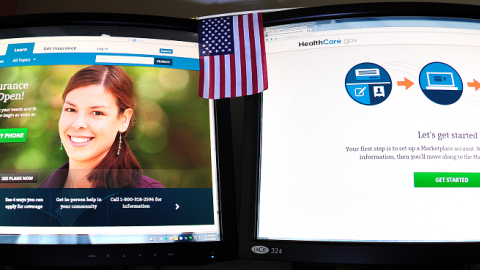Weelcome to the new conventional wisdom: Employer-sponsored health insurance, which developed by accident in World War II and subsequently became the main pillar of our health system, is in danger of disappearing. A new study by S&P Capital Research, a financial research firm, predicts that the employer-based system will most likely disappear by 2025. Even Ezekiel Emanuel, one of the architects of the president’s health care reforms and the brother of former White House chief of staff Rahm Emanuel, says in his new book that the bill’s health care exchanges will eventually supplant the existing system.
If true, this would be a disruptive development, as 170 million Americans now get their insurance via their employers. Like so much else in health care, the story of this rapid shift from reliance on employer coverage to its rapidly predicted demise centers on the Affordable Care Act.
When the Obama administration was promoting the ACA in 2009 and 2010, continued employer involvement was a given. Certainly the administration’s rhetoric would have had one think so. Not only did President Barack Obama repeatedly, and famously, promise that “If you like your health plan, you can keep it,” but other administration officials made the case as well. In 2009, Robert Gibbs, then the White House press secretary, said on CBS’ “Face the Nation”: “The president intends to build on the employer-based insurance market already in place” — and no administration spokespeople suggested otherwise.
From a political standpoint, it was important to make this case, since the polls have shown consistently that Americans with employer coverage were satisfied with that coverage. Disrupting it would have made it significantly harder to enact the ACA, if not altogether impossible.
But pass it did, and as the ACA continued to face political challenges, most of the bill’s advocates continued to claim that employees would be largely unaffected, even as small businesses were seeing that the ACA would increase their costs via a collection of taxes, fees and mandated forms of coverage. Despite these developments, MIT economist Jonathan Gruber, another of the ACA’s architects, argued that 80 percent of Americans’ health coverage, mainly those in employer plans, would be unaffected by the ACA.
But in the past few months, perhaps as the likelihood of the ACA’s repeal has diminished, a new argument from the ACA’s supporters has emerged. In February, Gruber told The Washington Post, “Employer-sponsored insurance is like a crumbling building. … There are essentially three things you can do: You can rebuild it, knock it down, or try and set up nets outside so people can be safe when they jump.” Or, as Emanuel puts it in his book, less colorfully if no less starkly, “By 2025, few private-sector employers will still be providing health insurance.”
Employers have mixed feelings about these predictions. On the one hand, they have provided health coverage for their employees for decades, and health benefits are an important recruiting and retention tool. For many employers, it is part of their corporate identity. Furthermore, employers, or at least the more responsible ones, have a stake in keeping their employees healthy. The key employee who disappears at a crucial stretch because of a preventable health condition such as a heart attack or stroke is a much bigger hit to the bottom line than the cost of preventive care for that employee.
On the other hand, employers have long been subsidizing the rest of the health care system, spending $578.6 billion annually on health care. A recent American Health Policy Institute study showed that employers will be facing marginal ACA-related costs of $4,800 to $5,900 per employee over the next decade. And the new S&P Capital study says that S&P 500 employers as a whole could save $700 billion by 2025 if they begin dropping coverage and pay the employer mandate penalty instead.
Even so, dropping coverage will not be a costless proposition for employers. If employers all pull out, the employer mandate penalty could become a lever that politicians will use to milk employers. It’s hard to imagine that Congress would allow employers to keep all of that $700 billion in projected savings, particularly if the federal deficit explodes from providing exchange subsidies to millions more people.
The White House still insists that employers will remain the main source of health care for Americans, but it may be only a matter of time before that changes. As the costs to employers mount, many on the left may follow Emanuel and embrace the concept of employers leaving the health care marketplace. When that happens, no one should be surprised. Back in 2007, before there even was an Obama administration, one Ezekiel Emanuel and co-author Victor Fuchs argued in The Washington Post that we should “Get businesses out of health care.” The American people may not have wanted this outcome, but businesses may now be getting out of health care sooner than previously thought.




















